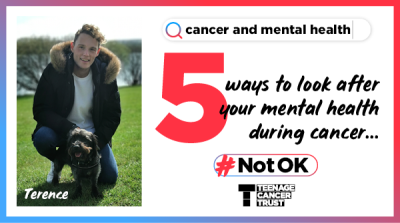5 ways to look after your mental health during cancer
Terence (26) was diagnosed with acute lymphoblastic leukaemia when he was 16 and was treated on the Teenage Cancer Trust unit at Leeds Children’s Hospital. He shares five ways to look after your mental health during cancer.
Cancer treatment can really lower your self-esteem and sense of self-worth. You go from being a normal person to feeling like an outsider. People who aren’t going through treatment just look through you like you’re not there. Often people speak to your parents about you rather than addressing you. It makes you feel so worthless.
It can also make you feel really isolated. If people did ask how I was, I would just say that I was OK. It was easier saying that than having to explain things. I guess I kept everything in as I wanted to be strong for other people.
But I learnt there are things that help when you’re feeling like this during cancer treatment. That’s why I wanted to share what worked for me – so others don’t have to keep everything in.
1. Talk to your friends and family
My mental health affected my relationship with my mum a bit because I got snappy with her rather than telling her I wasn’t OK. But it also cemented the relationship and made it stronger.
My family offered me support and I knew that I could go to them about anything. They listened to my troubles and they valued me.
People can help you; you just need to take the first step.
2. Write things down
I found that writing things down really helped.
I didn’t write every day; just when situations were bad, or I was feeling down.
Once some time passed, I would re-read it and see how far I had come. I would think: ‘Wow, I can’t believe I felt like that’.
It showed me how I can handle things that upset me in the past.
3. Keep doing what makes you happy
I would also recommend finding out what makes you happy and pursuing that.
I like to take pride in my appearance and dress nicely, even if I was just going to the supermarket.
It made up for all of the times when people acted like I wasn’t there.
4. Take care of yourself after treatment, too
Having treatment was like a whirlwind. I was really busy and didn’t have time to think about everything, but when it stopped, and I was put back into real life, it hit me.
I saw that everyone else had achieved so much while I had been on treatment and it hit me like a brick wall.
By then, it wasn’t spoken about. I felt like the hospital helped save my life but didn’t help me put it back together.
So remember it’s OK to talk about how you’re feeling whatever stage of treatment or recovery you’re at, and know that you can ask for more support too.
5. There’s no shame in needing professional help
I was offered professional support during treatment, but I didn’t think I needed it.
My consultant must have picked up on something though as she referred me to a local counselling service and that helped.
So don’t be afraid to ask for or accept help from specialised mental health services. There’s no shame in needing support, and your mental health is just as important as your physical health.
If you’re a young person going through cancer and you feel you’re struggling with your mental health, please do speak to your clinical team, Teenage Cancer Trust Nurse or Youth Support Coordinator. They’ll do whatever they can to help you, which may include referring you to specialist support.
